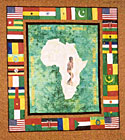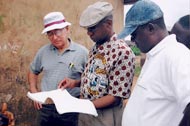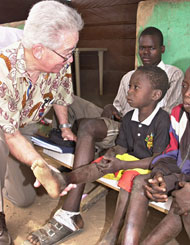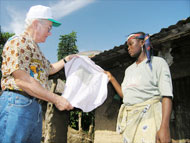
Fifteen years ago, Dr. Ernesto Ruiz-Tiben, then in his early 50s, was contemplating retirement. He had served 27 years as a commissioned officer of the U.S. Public Health Service at the Centers for Disease Control and Prevention, and was thinking about starting a new career and traveling. He got his wish in spades: a new job and long journeys, although he's not traveling for pleasure. Rather, his trips are often to the world's poorest, most remote regions where the scourge of the Guinea worm still lingers.
"I never did retire," says Dr. Ruiz-Tiben. "I came to work with The Carter Center."
He was drawn by the chance to help eradicate this debilitating disease, and to work with his former CDC colleague, Dr. Donald Hopkins, vice president for health programs at The Carter Center.
"Don put together a team unrivaled in its abilities and effectiveness. It's the reason I continue to work."
Since 1998, Dr. Ruiz-Tiben has directed the Center's Guinea Worm Eradication Program, tackling the ailment with the same determination he brought to his successful CDC efforts to control the disease schistosomiasis in his native Puerto Rico, and elsewhere.
"Our credo is, 'We'll be standing until the last worm goes,'" says Dr. Ruiz-Tiben, explaining that because the Guinea Worm never sleeps, this program must "outdo it at all places and at all times."
Already The Carter Center, and its many partners including the national Guinea worm programs, the World Health Organization and CDC, has helped eliminate the disease in 14 countries, and has targeted it in another six. The parasite infects people via their drinking water. After a year inside the body, the long worms emerge through painful lesions, often from the backs, breasts, legs, and genitals of their victims.
Defeating the parasite is primarily "a matter of education," says Dr. Ruiz-Tiben. When villagers learn to filter their water through simple nylon water filters before consumption, and not to enter the water when they are infected, the parasites disappear--they cannot survive without their human hosts. "That's why it can be eradicated worldwide," he says.
Even when faced with setbacks, such as in Ghana recently, where corrupt officials allowed a city's water supply to degrade and become re-infected, Dr. Ruiz-Tiben does not lose hope.
"It was one of the largest outbreaks I've experienced, with more than 1,000 reported cases, most in children. At one clinic, there was a chorus of children crying, having their worms pulled out. That's when I knew we had to keep going. There's no reason for suffering like that."
He knows the program will triumph, because of the villagers who are learning how to combat the disease. "As communities learn about the worm and its life cycle, they discover that they can get rid of it by themselves. We give them the lessons, but they do the work."
Guinea Worm Eradication Efforts are Family Affair
In addition to providing emotional support, Dr. Ruiz-Tiben's wife, Emilia C. Ruiz, celebrates his work artistically. For the past three years, she has made a Guinea worm quilt for an annual fundraiser and ski weekend the Carters hold for friends and donors of the Center (2003 quilt at bottom left). The first quilt sold for $47,000, which helped support the Center's work.
"The idea had come about because we had provided some funding to manufacture a cloth that could be used to identify village-based health workers working in the Guinea worm eradication program. There were so many interesting designs, and my wife had become fond of the art of quilting, so it just occurred to us to do a quilt using Guinea worm country cloths," Dr. Ruiz-Tiben said.
Learn More: Guinea Worm Eradication Program

Dr. Ernesto Ruiz-Tiben, director of the Center's Guinea Worm Eradication Program; Dr. Donald Hopkins, associate executive director of the Carter Center's health programs; and Dr. Andrew Seidu Korkor, national program coordinator for Ghana's Guinea Worm Eradication Program look over a case logbook from an endemic village in Ghana. Tracking village Guinea worm case data in detailed logbooks is very important in the Guinea worm eradication effort. (Photo: The Carter Center)

Dr. Ernesto Ruiz-Tiben, director of the Center's Guinea Worm Eradication Program talks with a young Ghanaian boy about the Guinea worms emerging from his body and what he can do to prevent spreading the disease or contracting the disease again in the future. (Photo: Carter Center/A. Poyo)

Dr. Ernesto Ruiz-Tiben, director of the Center's Guinea Worm Eradication Program inspects a household filter used to strain this Nigerian woman's drinking water. In endemic countries like Nigeria, filtering all drinking water is a key element in eradicating Guinea worm disease. (Photo: The Carter Center)
Please sign up below for important news about the work of The Carter Center and special event invitations.